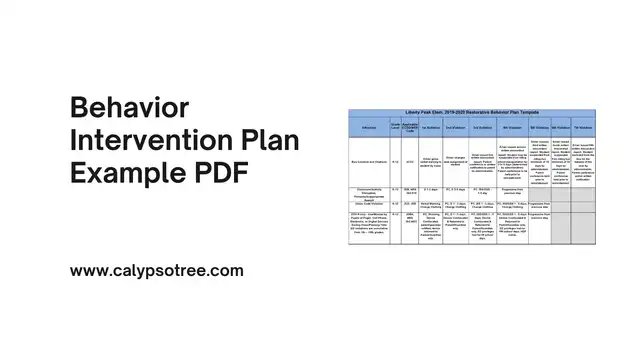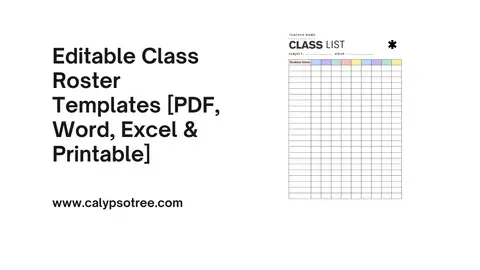Being an elementary school teacher is a rewarding job. These teachers help young children learn and grow and play a big role in shaping their future.
They teach different subjects, support students’ needs, and work with parents. Let’s look at the job description for an elementary school teacher and the skills they need.
What Are the Main Duties of an Elementary School Teacher?
An elementary school teacher helps young students learn and grow. Here are the main duties they perform:
Classroom Instruction:
- Teaching Lessons: Teachers spend a lot of time teaching students. They explain new ideas in ways that young children can understand.
- Fun Learning: They use books, videos, and hands-on activities to make learning fun.
- Checking Understanding: Teachers ask questions to see if students understand and encourage them to join in class discussions.
Lesson Planning and Preparation:
- Daily Plans: Planning lessons is a big part of a teacher’s job. Teachers create detailed plans for each day.
- Teaching Methods: These plans include what they will teach and how they will teach it.
- Materials Preparation: Teachers prepare materials like worksheets and visual aids to help students learn better.
Grading and Student Assessment:
- Checking Progress: Teachers need to check how well students are doing. They use tests, quizzes, and assignments to see what students have learned.
- Grading Work: Grading these assignments helps teachers understand which students need more help.
- Giving Feedback: They give feedback to students so they know what they did well and what they need to work on.
Classroom Management:
- Creating a Safe Environment: Managing a classroom is important for elementary school teachers. They need to create a safe and positive learning environment.
- Setting Rules: Teachers set rules and expectations for behavior.
- Handling Problems: They make sure students follow these rules and handle problems quickly and fairly.
By doing these main duties, elementary school teachers help their students get a good education, grow as individuals, and enjoy school.
Qualifications for an Elementary School Teacher
Qualifications needed to become an elementary school teacher are:
Educational Requirements and Degrees
To become an elementary school teacher, you need a good education. Most teachers go to college and get a degree in education. This is called a bachelor’s degree. It usually takes about four years to finish this degree. During these years, students learn about child development, teaching methods, and the subjects they will teach.
Teaching Certificate
After getting a degree, teachers need a special certificate to show they are qualified to teach. This is called a teaching certificate. To get this certificate, teachers must pass tests that check their knowledge and skills. Each state has its own rules for getting a teaching certificate. Some states might require more tests or extra courses.
Classroom Experience
Experience in a real classroom is very important for new teachers. Most teachers get this experience by teaching students. Student teaching is like an internship where future teachers work in a classroom with a real teacher. They get to practice teaching and learn from experienced teachers.
Ongoing Learning
Even after becoming a teacher, learning never stops. Teachers often take extra courses and attend workshops to learn new teaching methods. They might also get advanced degrees, like a master’s degree, to improve their skills.
Important Skills
Besides having the right education and certificates, teachers need important skills. They must be good at communicating with children and parents. They should be patient, understanding, and able to manage a classroom well.
Subjects Taught by Elementary School Teachers
Core Subjects
Elementary school teachers teach many important subjects. These subjects help students learn and grow. Here are some of the main subjects they teach:
- Math: Teachers help students learn how to add, subtract, multiply, and divide. They also teach about shapes, patterns, and numbers.
- Science: In science, students learn about plants, animals, the weather, and space. Teachers do fun experiments to help students understand these topics.
- English: English classes focus on reading, writing, and speaking. Students read stories and books, write sentences and paragraphs, and learn new words.
- Social Studies: This subject helps students learn about history, geography, and different cultures. They might learn about important people and events from the past.
Additional Subjects
Besides the core subjects, teachers also teach other important subjects. These subjects help students develop different skills and talents:
- Art: In art class, students get to draw, paint, and make crafts. This helps them express their creativity.
- Music: Music class is where students learn to sing and play instruments. They might also learn about different kinds of music.
- Physical Education (PE): PE classes help students stay active and healthy. They play games, learn new sports, and do exercises.
Lesson Planning and Preparation
Creating Lesson Plans
Teachers spend a lot of time planning lessons. They create plans to help students learn new things. A good lesson plan includes:
- What the lesson is about
- What students will learn
- How the lesson will be taught
- What materials are needed
Adapting Lessons
Not all students learn in the same way. Some might need extra help, while others might learn quickly. Teachers adapt lessons to meet the needs of different students. This means they might change how they teach or use different materials. For example, they might use pictures and videos for students who learn better visually.
Using Resources
Teachers use many resources to make lessons interesting. Books, computers, and educational games are just a few examples. These resources help students understand the lessons better and keep them engaged. Teachers also use technology like smart-boards and tablets to make learning more interactive.
Typical Work Environment
Here is a typical work environment:
- Classroom Setting: Elementary school teachers spend most of their time in the classroom, where they teach lessons and help students with their work. Classrooms are usually filled with desks, chairs, books, and other learning materials.
- Other Areas in the School: Teachers also use different areas. They might take students to the library to read books or do research. The gym is used for PE classes and physical activities. Sometimes, teachers use the computer lab to teach students how to use technology.
- Working with Others: Teachers don’t work alone. They often work with other teachers and school staff. They might plan lessons together or share ideas. Teachers also meet with school staff to discuss student progress and plan events. Working together helps teachers provide the best education for their students.
Skills Needed for an Elementary School Teacher
Important skills needed for an elementary school teachers are:
Communication Skills
Good communication skills are very important for teachers. They need to explain things clearly so that students can understand. Teachers talk to students every day, so they must also be good at listening. They also need to communicate well with parents and other teachers.
Patience
Teaching young children can be challenging. Children have lots of energy and sometimes struggle to sit still and listen. Teachers need to be patient and understanding.
Organizational Skills
Teachers have much to keep track of, like lesson plans, student work, and classroom materials. Being organized helps teachers stay on top of everything.
Creativity
Creativity makes learning fun and engaging for students. Teachers use their creativity to come up with interesting lessons and activities. They might use stories, games, and art projects to help students learn. Creative teaching helps students enjoy school and stay interested in their lessons.
For more information on school leadership roles, check out this job description for a school principal.
Other Important Skills
Teachers also need other important skills. They need to be good at problem-solving to handle different situations in the classroom. Flexibility is important because things don’t always go as planned.
Assessing Student Progress
Teachers need to check how well students are doing in their studies. They use different methods to see what students have learned.
Using Different Methods
These methods include:
- Tests: Tests help teachers see if students understand the lessons.
- Quizzes: Quizzes are shorter than tests but still show what students know.
- Projects: Projects let students show their learning in creative ways.
Tracking Progress
Tracking student progress helps teachers know who needs extra help. They keep records of test scores, quiz results, and project grades. This helps teachers see how each student is doing over time.
Giving Feedback
Giving feedback is important for student improvement. Teachers tell students what they did well and what they need to work on. Positive feedback encourages students and helps them feel proud of their work. Constructive feedback shows students how to get better.
Challenges Faced by Elementary School Teachers
Classroom Management
Managing a classroom can be hard. Teachers use different strategies to keep the classroom orderly and help students behave well.
Different Student Needs
Students have different needs and learn in different ways. Some students might need extra help with certain subjects. Others might need more challenging work to stay engaged. Teachers must find ways to meet all these different needs. This can be hard but is very important for student success.
Workload and Time Management
Teachers have a lot of work to do. They plan lessons, grade assignments, and prepare materials. They also spend time meeting with parents and other teachers. Managing all this work can be tough. Good time management skills help teachers get everything done and still have time for themselves.
Role in Student Development
Academic Support
- Helping with Subjects: Elementary school teachers help students learn new things in subjects like math, science, and reading.
- Explaining Lessons: They explain lessons in ways that are easy to understand.
- Answering Questions: Teachers answer questions and give extra help when students need it.
- Ensuring Learning: They make sure each student is learning and doing their best.
Social and Emotional Growth
- Teaching Social Skills: Teachers also help students grow socially and emotionally.
- Promoting Kindness: They teach students how to get along with others, share, and be kind.
- Managing Feelings: Teachers help students understand and manage their feelings.
- Creating a Safe Environment: They create a safe and friendly classroom where students feel happy and comfortable.
Encouraging a Love of Learning
- Making Learning Fun: One of the most important roles of a teacher is to make learning fun.
- Using Games and Stories: Teachers use games, stories, and activities to make lessons exciting.
- Showing Importance of Learning: They show students that learning is fun and important.
- Developing Lifelong Learning: By doing this, teachers help students develop a love for learning that lasts a lifetime.
Building Confidence
- Praising Hard Work: Teachers help students build confidence in themselves.
- Encouraging Achievements: They praise students for their hard work and achievements.
- Believing in Themselves: When students believe in themselves, they are more likely to try new things and keep learning.
- Setting Goals: Teachers encourage students to set goals and work towards them.
Collaboration with Parents and Staff
Working with Parents
- Conferences: Teachers work closely with parents to support students. They have conferences to talk about how students are doing in school.
- Sharing Learning: During these meetings, teachers share what students are learning and how they can improve.
- Teamwork: Parents and teachers work together to help students succeed.
Supporting Special Needs
- Extra Help: Some students need extra help because they have special needs.
- Special Education Staff: Teachers work with special education staff to make sure these students get the support they need.
- Inclusive Lessons: They plan lessons and activities that help all students learn, no matter their abilities.
Team Meetings
- Meeting with Staff: Teachers often meet with other teachers and school staff.
- Staying on the Same Page: These team meetings help everyone stay on the same page.
- Sharing Ideas: They share ideas and plan activities together.
- Teamwork for Success: Working as a team makes it easier to help all students succeed.
Communication
- Informing Parents: Good communication is key to working with parents and staff.
- Keeping Parents Informed: Teachers keep parents informed about what is happening in the classroom.
- Sending Updates: They send notes, emails, and newsletters home. This helps parents feel involved in their child’s education.
Professional Development
- Learning New Skills: Teachers also keep learning new things to improve their teaching skills.
- Attending Workshops: They attend workshops and training sessions.
- Improving Teaching: This helps them learn new ways to teach and support their students.
- Doing Their Best Job: Working with other teachers and learning new skills helps teachers do their best job.
Job Description for an Elementary School Teacher
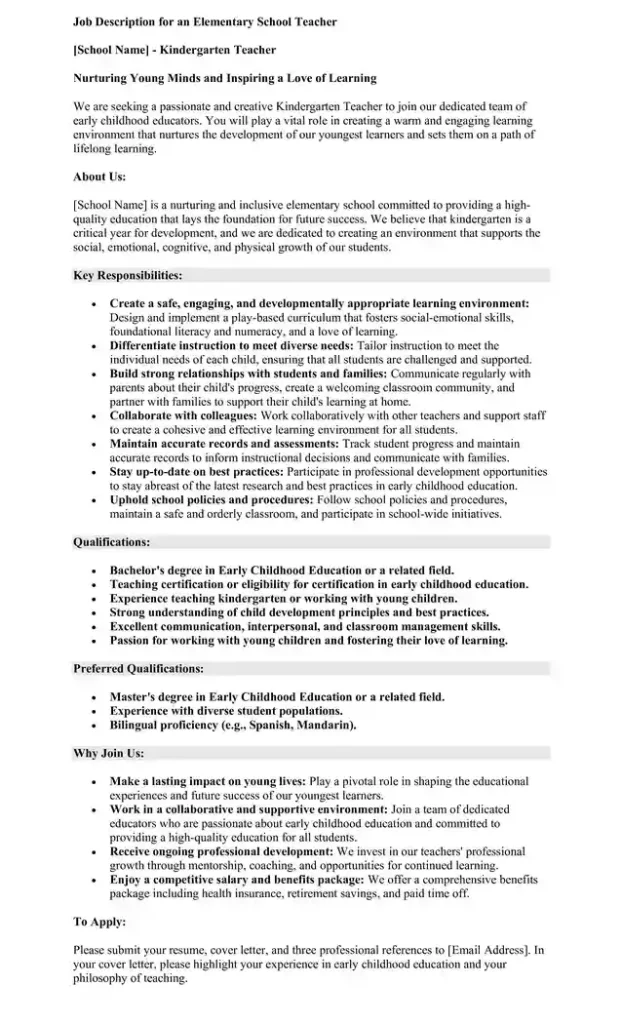
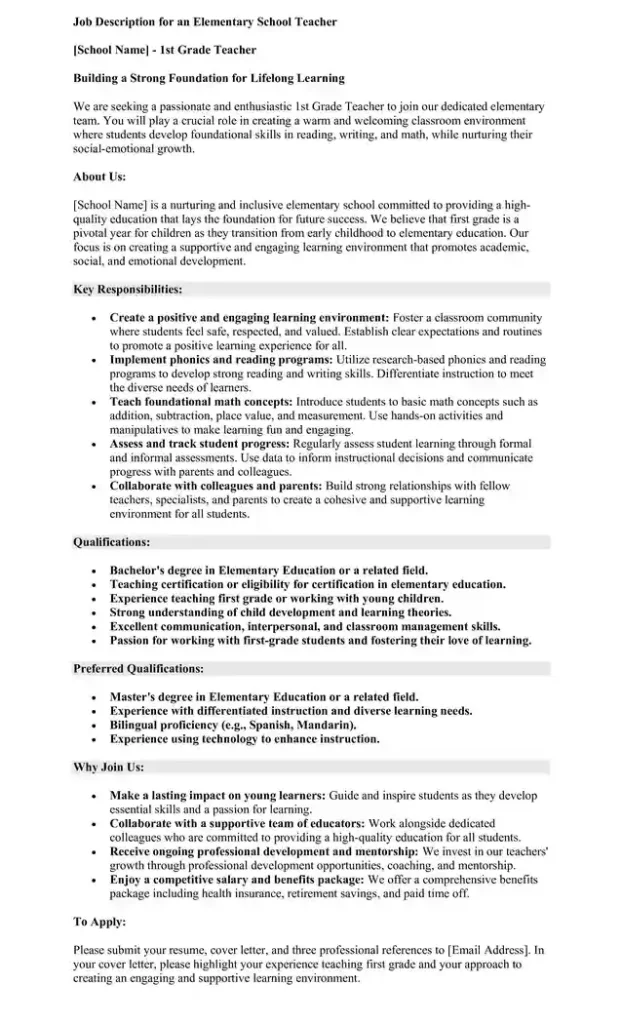
Job Description for an Elementary School Teacher – 2. 1st Grade Teacher
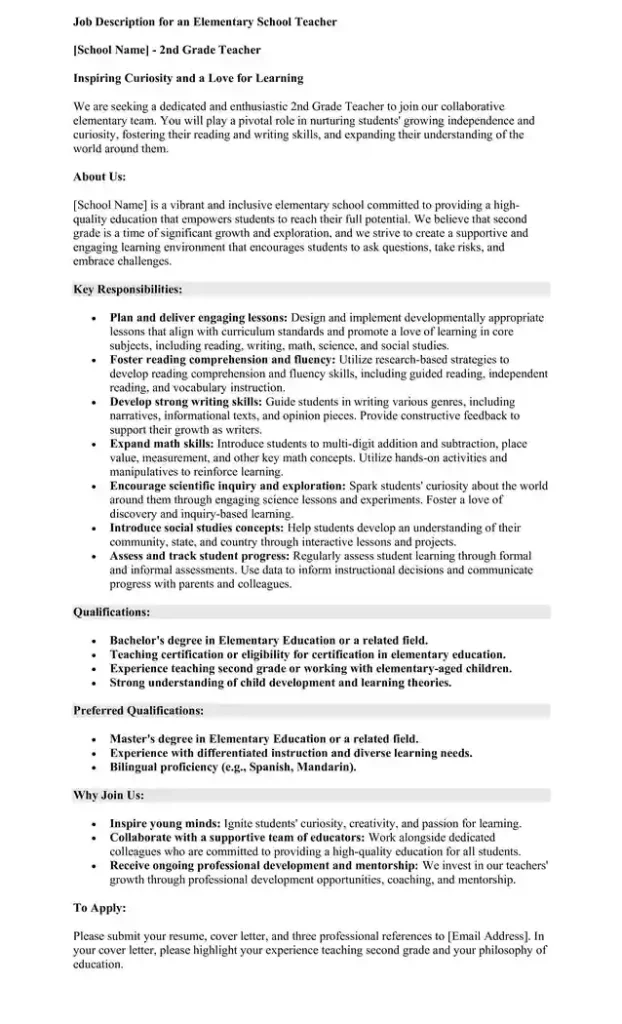
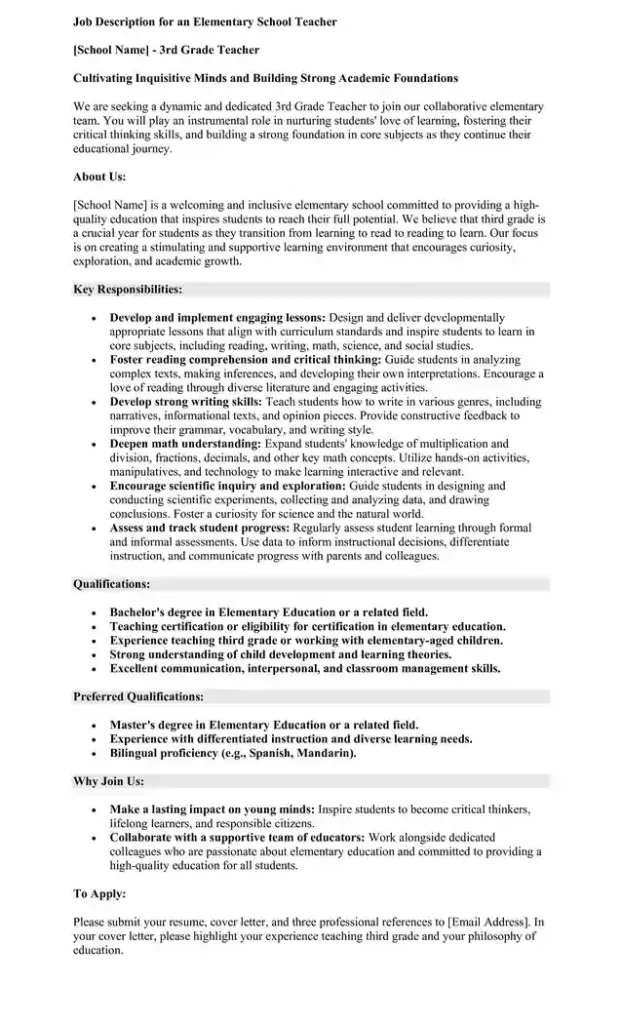
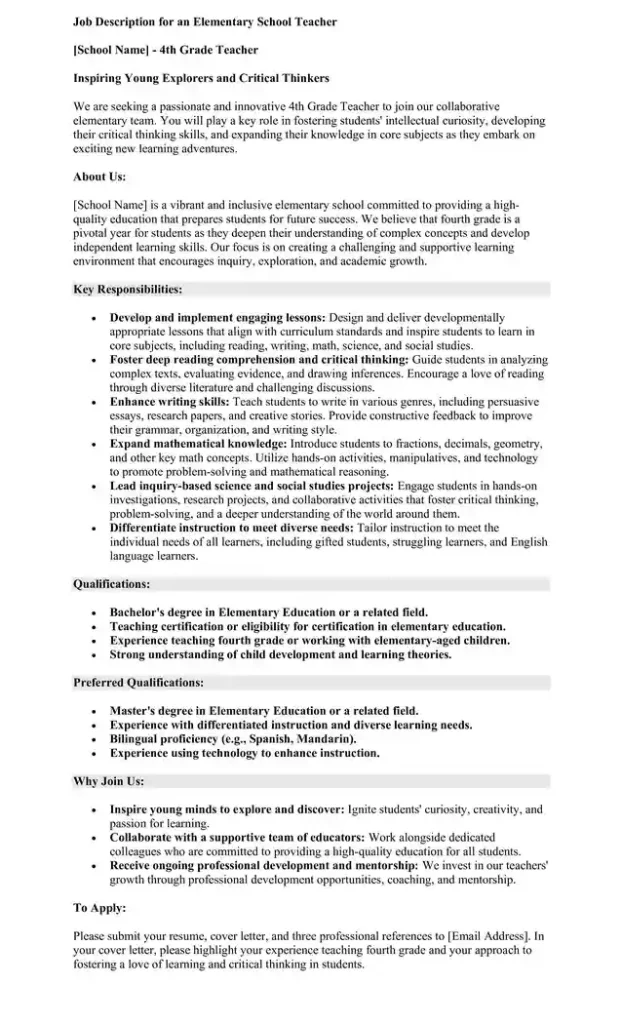
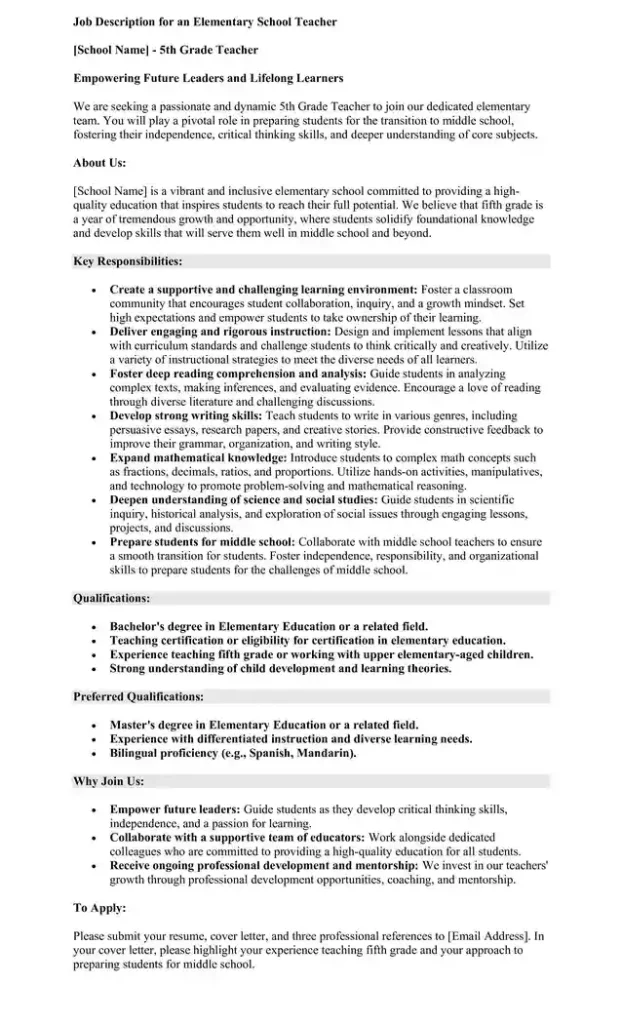
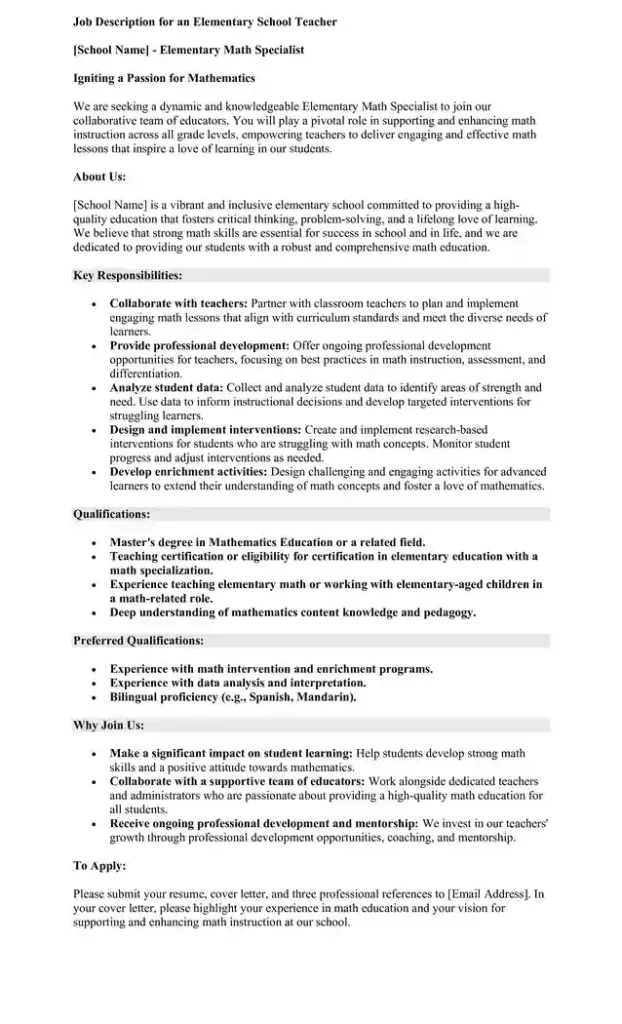
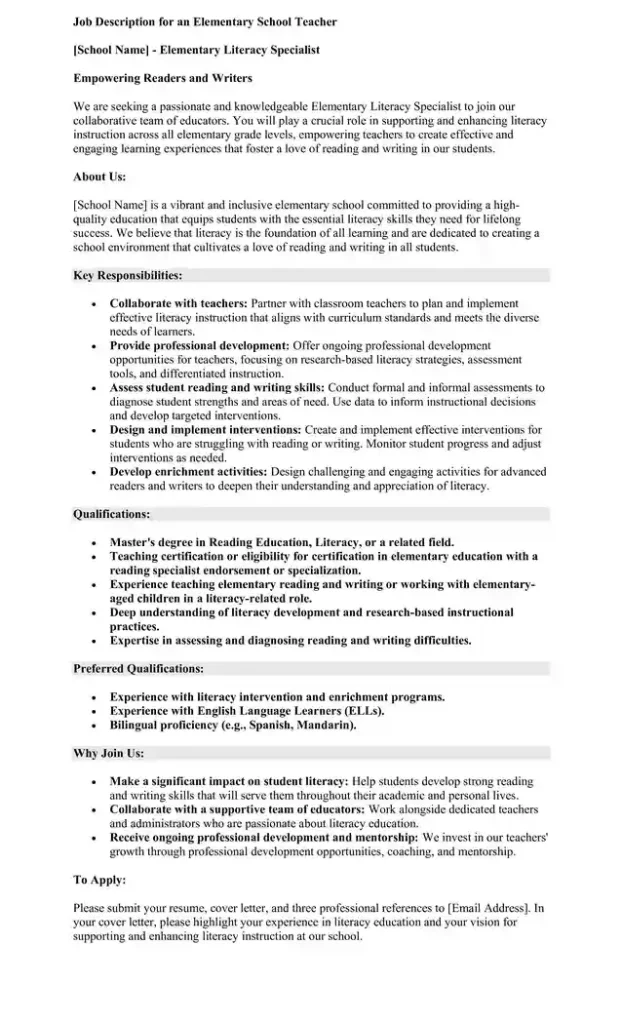
Elementary School Teacher Salary
Salary Estimates
The salary of an elementary school teacher can vary based on location and experience. Here are some estimates from different sources:
- Indeed: According to Indeed, the average salary for an elementary school teacher is between $43,000 and $100,000 per year.
- Salary.com: As per Salary.com, the salary range for an elementary school teacher in the United States is between $43,000 and $91,000 per year.
- ZipRecruiter: ZipRecruiter reports that elementary school teachers in Indiana earn between $36,000 and $62,000 per year.
Elementary School Teacher Benefits
Being an elementary school teacher has many benefits:
- Making a Difference: Teachers help shape the future by educating young children.
- Job Security: There is always a need for teachers, so the job is stable.
- Creative Work: Teachers can use creativity to make lessons fun and engaging.
- Time Off: Teachers usually have summers off and school holidays.
- Personal Growth: Teaching helps you learn new things and improve your skills.
- Community Impact: Teachers play an important role in their communities by helping children succeed.
In conclusion, Being an elementary school teacher is a big job with many duties. It requires special skills and qualifications. Despite the challenges, it is a very rewarding career. Teachers make a big difference in the lives of their students.

Alexander is a skilled HR expert who writes clear and compelling job descriptions. He has spent over 15 years in the HR field, helping companies find and keep the best employees. With a degree in Human Resources Management from the University of Chicago, he has the knowledge to back up his experience.







